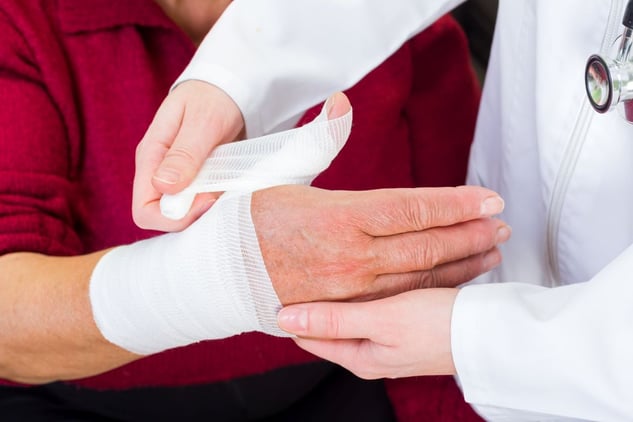
Along with your primary care physician and endocrinologist, wound care specialists are an integral part of your healthcare team if you have diabetes. While you may not consider wounds of primary concern, the prevalence of foot ulcers is very high for those with diabetes. An estimated 19 to 34% of adults with diabetes will develop a foot ulcer during the course of their lifetime, and a large percentage of these ulcers will become infected and require amputation.
Prevention, early intervention, and specialized wound care can help reduce the incidence of infection and amputation related to diabetes. Wound care specialists have specific skills to help you prevent wounds from developing and worsening.
Diabetic wound care requires a specialized approach for a number of reasons. Let’s examine the top four reasons so that you can ensure that you or your loved ones can seek the best possible outcome for diabetic wound care.
1. The complex nature of diabetic wounds requires careful attention.
A body with diabetes has a different reaction to wounds than those without diabetes. If you have diabetes, your body may have a difficult time healing wounds for a number of reasons. Even a small wound can pose a dangerous risk if not managed properly.
The blood glucose fluctuations associated with diabetes appear to affect your body’s ability to heal. When the condition isn’t under control, it can cause the following damaging effects:
- Nerve damage
- Decreased feeling in your extremities
- Weakened skin barriers
- Poor circulation
All of these factors further complicate wound healing. With thinner skin and decreased feeling, for example, you may develop an open sore on your foot and not even know it. An open sore can then progress into an ulceration and future complications.
The provider who handles your wound care must have the knowledge and expertise to tackle the extra challenges that diabetes presents. The complex nature of diabetic wounds requires distinct considerations in order to avoid additional difficulties.
2. Diabetic wounds can have serious repercussions.
Because men and women with diabetes have healing difficulties, they also face more potential for complications from wounds. Wounds that don’t heal leave more opportunities open for infection to enter.
Left untreated or improperly managed, an infection can spread and lead to osteomyelitis (local muscle or bone infection), gangrene, or sepsis. Infections like gangrene are a leading cause of amputation. If an infection spreads into the bloodstream, it can lead to sepsis and, ultimately, death.
Pain, amputation, and death are real concerns for those with diabetes, which can often be avoided with proper care. A wound care specialist can detect and intercede problems before they cause irreversible damage.
If you have diabetes, it’s important to visit a wound care center when you notice new open sores because of the seriousness of the risk.
3. Wound care treatment for diabetics is different from other wound care treatments.
All wounds aren’t created equal and, therefore, require different treatment protocols. The same treatments that are used for people without diabetes aren’t always as effective as the ones for those with the condition. In the same way, what works for one person doesn’t always work for another, so it’s important that every patient is treated with a personalized plan.
Diabetes wound treatment requires an aggressive, specialized approach. The 6 unique keys to wound healing for those with diabetes include:
- Wound assessment: determine if a wound is caused by blood flow (ischemic) or nerve (neuropathic) problems or a mix of both (neuroischemic)
- Tissue debridement: removal of dead tissue
- Infection control: aggressive treatment with oral and/or topical antibiotics and dressings
- Moisture balance: proper moisture regulation during the various stages of healing
- Pressure relief: a cast or device to redistribute pressure from the wounded limb
- Disease management: treatment for underlying factors such as blood glucose levels, smoking, and nutrition
Uncontrolled blood sugar levels impair the function of white blood cells, which impact the healing process. Therefore, blood glucose management is important in proper wound care for people with diabetes.
These varying factors emphasize the importance of an individualized, specialized approach for wound care for diabetics.
4. The most targeted treatment provides the best results.
While many healthcare providers, such as podiatrists, have some training in wound care, wound care specialists have advanced knowledge of wound care for diabetics, specifically. Wound care specialists have to go through special training after earning a bachelor’s degree in nursing or higher to earn their certification.
Wound care specialists acquire comprehensive, in-depth knowledge for assessing and treating wounds. They have more information and techniques at their disposal to promote healing and prevent complications. They have access to advanced technologies such as skin grafts, wound vac therapy, and oxygen therapy which makes these professionals your biggest supporters in recovery.
As you recover, you may be able to perform progressive exercises to increase your stamina and rebuild your breathing muscles. Ventilation weaning and tracheostomy care may also be part of your treatment plan.
With their expertise, wound care specialists can detect problems early and help you make the best progress toward full recovery.
Find a wound care center for treatment
The best place for wound treatment if you have diabetes is a wound care center with on-site wound care specialists. These providers are best equipped to help you recover from surgery or heal open sores in ways that result in the best outcomes.
Rehab Select gives you access to comprehensive wound care services usually only found in hospital settings. The on-staff wound care doctors and nurses have specialized expertise in managing the complexities of diabetic wound care. If you or a loved one has diabetes, and wound care is an essential part of recovery, contact Rehab Select today to discuss the next steps.





